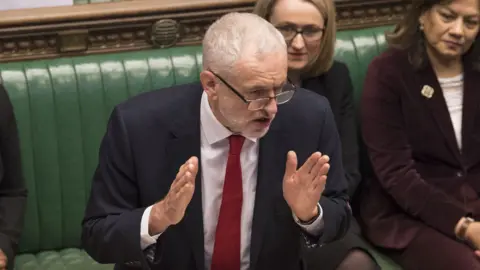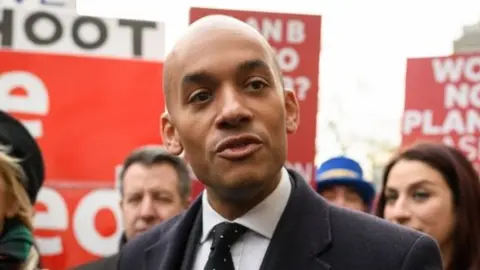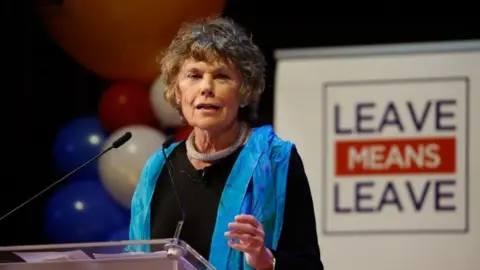Brexit: Where Labour's factions stand
Brexit has driven a coach and horses through traditional party politics at Westminster.
A couple of week ago, we tried to work out how many Conservative MPs belonged to the different Brexit factions in Theresa May's party.
Now, based upon their voting records and public statements, we have attempted to do the same for Labour.
Here is where the different factions of the Labour's 254 voting MPs stand on Brexit.
It should be noted that these categories are fluid and many MPs are sympathetic to more than one group.
We have not counted the MPs that have resigned the party whip or been expelled since the 2017 general election.
Front bench and party loyalists
 UK Parliament/Mark Duffy
UK Parliament/Mark DuffyEstimated number: 129
Officially, Labour is seeking a new tariff-free customs union and close ties to the single market.
At its September conference, the party agreed to prioritise a general election but also decided that if this could not be achieved, then all other options must remain on the table, including another referendum.
Allow X content?
The frontbench amendment put forward on Tuesday - which was defeated - was designed to move this position forward as it asked the government to make time to for Parliament to "consider and vote" on options to prevent a no-deal Brexit, including "legislating to hold a public vote on a deal or a proposition that has commanded the support of the majority of the House of Commons".
Against another referendum
 Getty Images
Getty ImagesEstimated number: 25
The one thing that unites most Labour MPs is a desire to avoid a no-deal Brexit.
But they are split over how to achieve that:
- a deal in place by the end of March
- an extension to Article 50 to find time to re-negotiate
- the public to be given another say
And Labour MPs in strong Leave-voting areas - many in the north of England and the Midlands - are torn between the wishes of their constituents, who want to see Brexit achieved, and the party's official policy.
MPs such as Caroline Flint (pictured) and Melanie Onn have been vocal in their opposition to the People's Vote campaign - partly believing it to be an attempt to overturn the 2016 referendum result.
Allow X content?
Others in the party fear a new vote would not settle the argument either way in the event of a close result and that another divisive campaign would split the country even more and cause longer-term damage to trust in politicians.
They also point to the party's 2017 general election manifesto, which said: "Labour accepts the referendum result."
These are the MPs Prime Minister Theresa May is hoping to convince to defy their party leadership and back her deal when it returns to the Commons.
People's Vote
 Getty Images
Getty ImagesEstimated number: 89
Some Labour MPs represent some of the strongest Leave-voting areas in the UK - but others, such as Chuka Umunna (pictured), hold constituencies in metropolitan districts or cities that were overwhelmingly in favour of Remain and they too want to reflect the views of their voters.
A recent letter calling for another referendum was signed publicly by 72 MPs, including party grandees Margaret Beckett and Margaret Hodge. However, the overall figure of MP backers is believed to be higher.
People's Vote supporters point to the views of the party members to support their decision. A recent survey of more than 1,000 Labour members suggested 83% had voted Remain and 72% wanted Jeremy Corbyn to back another referendum.
Labour Brexiteers
 Getty Images
Getty ImagesEstimated number: 9
This group tends to be split into two camps:
- the MPs who strongly campaigned for leave during the referendum, such as Kate Hoey (pictured)
- those who are determined to implement the result - even voting alongside the government to do so
Three Labour MPs - John Mann, Ian Austin and Sir Kevin Barron - voted in favour of the prime minister's withdrawal agreement that was heavily defeated in mid-January.
Others have indicated they could potentially vote for a future deal, providing the Irish backstop is replaced with "alternative arrangements" to prevent a hard border, and some have rebelled against their party or refused to take part in key Brexit votes in Parliament.
Common Market 2.0
 Getty Images
Getty ImagesEstimated number: 2 (but potentially much higher)
Manchester Central MP Lucy Powell and Aberavon MP Stephen Kinnock (pictured) are at the forefront of cross-party attempts to pivot towards a different model for Britain's future relationship with the EU that they argue meets Labour's six tests and delivers on the referendum result.
More colloquially known as "Norway plus", it would remove Britain from the contentious Common Fisheries Policy and Common Agricultural Policy but the UK would have to accept the free of movement people in most circumstances.
Allow X content?
Though only two Labour MPs formally back this move, informal support may be much higher.
In June, 75 MPs defied the party whip to vote in favour of remaining in the European Economic Area, which Norway is a member of.
However, many of these rebels also back another referendum.
Critics have included Jeremy Corbyn himself, who says it leaves Britain as an "across-the-board rule-taker of EU regulations, without a say".
